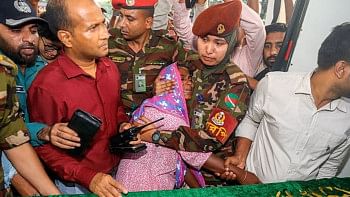Absence of Ducsu for decades degraded student politics
Ahead of the much-anticipated Ducsu polls on March 11, one burning question has been making the rounds.
Will it be meaningful and reinstate Ducsu's vibrant soul that had been the epicentre of many watershed events in the country's history?
Dhaka University Central Students' Union (Ducsu) acted as a vanguard of students' and people's rights at every crossroad -- from the Language Movement to the Liberation War to the anti-autocracy movement in 1990.
Unfortunately, Ducsu election has not taken place since 1990.
Taking advantage of no accountability, student leaders -- particularly those linked to ruling parties -- kept flexing muscles on campus, ruining the academic experience for general students, former Ducsu leaders said.
Student activists associated with successive ruling parties were also hardly concerned about academic problems such as rising cost of education, non-availability of seats, substandard food at the halls and session jam.
“Absence of election to Ducsu and other student unions for decade after decade has intensified the degradation of student politics that has a glorious past,” Dhaka University Professor Emeritus Serajul Islam Choudhury told The Daily Star.
He said that elected student unions were concerned with extra-curricular, cultural, sports and creative activities. They were always holding the authorities accountable over students' rights.
“Absence of student unions means absence of these,” he added.
“In the past, student politics was aimed at ensuring welfare of students and protecting their rights, and taking to the streets over national issues. Now student politics is about flexing muscles for personal and party interests,” former Ducsu vice president Mahmudur Rahman Manna said.
Academics and former Ducsu leaders observed that student politics has turned violent since 1990 and more importantly, has become subservient to political parties.
As a result, student politics these days is synonymous with violence, extortion, tender manipulation, taking over dormitories and doing the bidding of political parties the student organisations are associated with, they added.
Student politics in the country took a sharp downward turn after 1990s. Ruling party backed student organisations established unilateral control on campus by driving out their peers associated with opposition parties, they observed.
Intra and inter party clashes in the name of student politics in recent times have claimed a number of lives.
Student politics is mainly controlled by major political parties, and as a result they lost their independent existence. The political parties found it easy to control student politics in absence of elected student unions in universities and colleges, they said.
Academics said that a more damaging aspect is that activists of student organisations associated with ruling parties are used as a force to resist any anti-government movement.
On many occasions, ruling party backed student organisations carry out lethal attacks. They also force students to join their programmes at hall guest rooms, terming it “guest room programme”, and other political events, they said, adding that it could have been averted had Ducsu and other student union elections been held regularly.
When asked, Sultan Mohammad Monsur Ahmed, a former vice president of Ducsu, said student politics turned corrupt due to the absence of elections at public universities.
“Holding of central student union elections at public universities could create patriotic politicians in the country,” said Monsur, a Gonoforum leader and also a lawmaker-elect.
Another former Ducsu VP Mahfuza Khanam also blamed the absence of student union elections for a long time as a key reason for the present sorry state of student politics in the country.
“There's none to represent the students. In the absence of Ducsu, cultural and social progammes hardly took place,” she said.
The last general secretary of Ducsu, Khairul Kabir Khokon, said in absence of Ducsu election not only student politics lost its way but also it is now being controlled by others.
“Dominance of businessmen is increasing in politics as no new leadership has developed from Ducsu,” he added.
Shantanu Majumder, Associate Professor of Political Science of DU, said that nowadays student leaders are busy serving the “parent political parties”. But Ducsu election can change the scenario, he hoped.
“If any student leader wants to take part in Ducsu election, he/she has to work on issues involving students and ensure their rights before seeking their mandate,” he said.
Shantanu also feared that some civil society members are trying to stigmatise student unions in an attempt to keep general students away from politics.
Serajul Islam blamed BNP and Awami League for not holding Ducsu elections.
“Ruling parties after 1990s were responsible, as they did not want student union election. They feared that activities of Ducsu will go against their interests,” said Serajul Islam.
Mahfuza said that successive governments might have feared that their party backed student organisation may not win in the Ducsu election. “That's why they didn't want election,” she said.


 For all latest news, follow The Daily Star's Google News channel.
For all latest news, follow The Daily Star's Google News channel. 



Comments